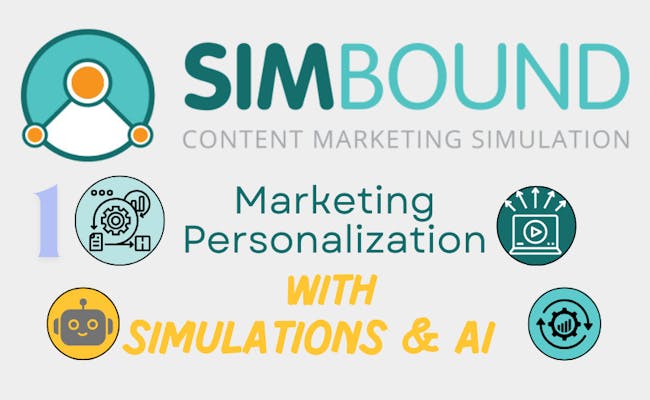Simulations - the key to teaching personalization in digital marketing in the age of AI
Learn about the latest developments in using AI to teach personalization in digital marketing. This article is the first in a 2-part series that discusses current practices at Simbound, a leading provider of digital marketing simulations.

Introduction
AI is clearly the defining trend in online marketing today. It facilitates the improvement and personalization of brand communications, as well as the running and adapting of various content and assigning programmatic advertising feeding on existing, recent as well as predictive data.
The possibilities are endless when it comes to adapting messaging through different writing styles and in the brainstorming of new ideas for promotions, new services, or new products. With the help of AI, it's now easy to refine targeting approaches, build client personas, and adapt to large-scale changes in the audience or market environment. Advertising systems are leveraging AI to inform marketing managers about changes in their campaign outlooks and provide more accurate predictions by gathering vast amounts of data across industries.
Conducting preliminary market research through keyword analysis performed by AI or other time-consuming processes, such as parsing and layout of unstructured customer behavior data, can be accomplished with greater ease and without extensive prior training.
One of the most useful applications of AI in marketing today is the automation of customer data analysis and that of ongoing campaign optimization. This capability quickly signals to marketing and business owners what consumers are interested in and where demand is headed. In some cases, it can calibrate the entire marketing process to align to the latest market insights. Because of AI digital marketing has become highly agile, and with the increasing adoption of automation, the ability to swiftly adapt to the latest shifts in market preferences can no longer be a significant competitive advantage, as more and more companies are incorporating such methods.
What are the most effective learning methods of personalization of marketing with AI within Simbound?
The simulation learning environment with its extensive data sets is conducive to the implementation of artificial intelligence (AI) for learning and the generation of insights. A meticulously designed simulation setup enables the execution of host of empirical experiments thereby equipping digital marketers with the capacity and propensity to manage data assignments in a structured manner using multivariate experiments all of this within a controlled and secure edtech medium. Students are able to perform a wide range of activities: carry out research, fine-tune and adaptat various marketing assets by using the following types of data:
- Audience demographic and behavioral data from the Social Media Marketing simulation, which includes actionable information on age, occupation, location, gender, etc.
- Interest level and product preference data found in the Email simulation - where students can perform A/B testing, what-if analysis, and isolated experiments by limiting exposure to certain messages to a subset of the audience.
- Market research data which shows which products are being advertised by competitors (through the search engine simulation) and highlighting location-specific search trends (e.g. compare preferences and SEA campaign results in the UK vs. the US).

Setting up personalized marketing within the simulation will demonstrate an understanding of the characteristics of each consumer segment that is targeted. This will allow for an ample creative space to be taken up with interesting and memorable messaging, timely promotions, and various actions. The simulation will assess the degree to which personalization takes place and whether this is released in the right context/market environment.
AI assists learners in analyzing data and trends from different data sources. This process would normally take a lot of time when done manually by inexperienced users. In Simbound, students or teams of students will get automatic ratings of their performance. These ratings show what they do well and what they should do to improve. This approach helps focus attention and to work in a more efficient manner, reducing the time and effort spent on the overall activity.
In the case of carrying out personalization in marketing, further research and profiling should be encouraged by using outside information, such as recent reports about consumer insights and market trends. This information can then be factored in the simulation decisional process and will help with planning and carrying out of various marketing campaigns.
When using AI, students should be able to explain why they chose a creative campaign's theme and why their approach is valid. Going beyond and building reports on top of the numerical results obtained during the simulation can open up new discussions that facilitate learning and sharing of best practices in class.
In the next article we will dive deeper into how AI is being used by the Simbound system and also we will outline some of the more common criticism associated with the overreliance on AI and outline a few methods to keep courses relevant and up to par on quality indicators.
Relevant read: One tutors’ recent experience with grading with the help of GenAI
. https://www.timeshighereducation.com/campus/will-ai-revolutionise-marking
How Simbound can help you with your course

To ensure a comprehensive assessment of learning, it is essential to incorporate critical thinking and critical evaluation of various decisions and approaches. Assessment methods should evolve and continue to be refined and adapted to incorporate innovative techniques enabled by generative and analytical AI and simulations. These methods remain one of the most reliable for grading and learning, as they cannot yet be controlled entirely by AI.
When designing a new study program that incorporates the latest technology, it is essential to consider how to effectively utilize the technology to achieve expected results in terms of delivery, consistency, and quality. While technology plays a role, expertise, communication and experience remain the most significant predictors of project success .
At Simbound, we have supported numerous educational institutions worldwide in achieving remarkable progress and unlocking new capabilities within their organizations. Contact us today to learn more what we can do for your course.
